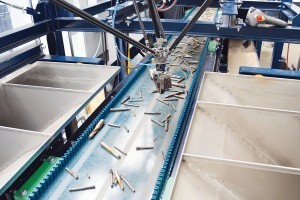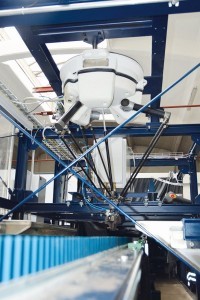The Fraunhofer Institute for Laser Technology ILT and Cronimet Ferroleg GmbH have developed a laser-based sorting process for scrap metal called PLUS in order to strengthen the industry's competitiveness in terms of raw material supply.
A new sensor makes the recycling of metallic raw materials many times more efficient than was previously possible. The EU project "REVaMP" goes one step further. Since January 2020, Fraunhofer ILT experts have been contributing their expertise in the field of material analysis at a European level, making an important international contribution to securing the long-term supply of resource-efficient raw materials.
Germany as a production location and thus our social prosperity depend to a large extent on the availability of metallic raw materials such as chromium, nickel, copper and cobalt. However, due to rising global demand, these are becoming an increasingly scarce commodity. Material recycling therefore plays a crucial role. Due to the lack of natural resources, this is the most important source of metallic raw materials in Germany and Europe.
Better balance - ecologically and economically
 Figure 2: A laser-based sorting process, developed in the BMBF PLUS project, allows valuable alloys to be efficiently recovered from scrap metal The advantage of material recycling: used scrap metal that can no longer be used, such as pipes, sheet metal, tools, old cables, electrical and electronic scrap and old household or demolition parts, can be melted down by type and reused with virtually no loss of quality. Due to the high value of the materials, the process ideally pays for itself - and produces significantly lessCO2 than the primary process: the expensive, technically complex extraction of mineral resources under sometimes highly critical conditions and their transportation to destinations around the globe is no longer necessary.
Figure 2: A laser-based sorting process, developed in the BMBF PLUS project, allows valuable alloys to be efficiently recovered from scrap metal The advantage of material recycling: used scrap metal that can no longer be used, such as pipes, sheet metal, tools, old cables, electrical and electronic scrap and old household or demolition parts, can be melted down by type and reused with virtually no loss of quality. Due to the high value of the materials, the process ideally pays for itself - and produces significantly lessCO2 than the primary process: the expensive, technically complex extraction of mineral resources under sometimes highly critical conditions and their transportation to destinations around the globe is no longer necessary.
The crux of the matter is that both the price and availability of scrap metal and its recycling rate depend on numerous mutually dependent factors. These include fluctuating prices on the primary market, the life cycle of products and their collection rate, losses in the process, technical recyclability and the value of the alloy in question. The global markets are correspondingly volatile. If the price of primary metals rises, the availability of scrap decreases and vice versa. This entails high risks for companies.
More yield through the use of lasers
Against this background, the Fraunhofer ILT and Cronimet Ferroleg GmbH from Karlsruhe have developed a new type of laser-based sorting process. The sensor technology developed as part of the PLUS project funded by the German Federal Ministry of Education and Research (BMBF) makes the detection and sorting of alloys in scrap metal much faster and more accurate. The pilot system was put into operation at the Cronimet-Ferroleg site in Karlsruhe in 2020 - and has proven its worth! Among other things, it is designed for processing high-speed steels, or HSS for short.
"HSS steels contain valuable alloying elements such as cobalt and can be found in every DIY store. For example, in drills or milling heads," says Dr. Cord Fricke-Begemann, who is responsible for materials analysis at the Fraunhofer ILT and led the PLUS project with the support of doctoral student Fredrik Schreckenberg.
Conventional methods are limited to the laborious manual measurement of a few alloys. With laser emission spectroscopy (LIBS), however, the Fraunhofer ILT uses a technology that can identify more than 20 special alloys even in small pieces of scrap - automatically, quickly and without contact. "We can process more scrap in less time and achieve a higher degree of purity," says Fricke-Begemann. "We are thus building an important bridge between research and industry."
Future technology for Europe
 Figure 3: The pilot plant for laser-based recycling, which was developed in the PLUS project, is suitable for the automatic processing of high-speed steels, forexample As part of the EU project "Retrofitting Equipment for Efficient Use of Variable Feedstock in Metal Making Processes" (REVaMP), which was launched in 2020, Fraunhofer ILT is now also contributing its expertise in the field of material analysis at European level. The project, which is scheduled to run for three and a half years, is supported by an international consortium of companies and research institutes from Spain, Poland and Germany. "The aim is to put the findings gathered as part of the PLUS project on a universal basis, regardless of the respective alloys," says Fricke-Begemann. "We want to build a sensor that can be installed in existing industrial plants to make the recycling process fundamentally more efficient."
Figure 3: The pilot plant for laser-based recycling, which was developed in the PLUS project, is suitable for the automatic processing of high-speed steels, forexample As part of the EU project "Retrofitting Equipment for Efficient Use of Variable Feedstock in Metal Making Processes" (REVaMP), which was launched in 2020, Fraunhofer ILT is now also contributing its expertise in the field of material analysis at European level. The project, which is scheduled to run for three and a half years, is supported by an international consortium of companies and research institutes from Spain, Poland and Germany. "The aim is to put the findings gathered as part of the PLUS project on a universal basis, regardless of the respective alloys," says Fricke-Begemann. "We want to build a sensor that can be installed in existing industrial plants to make the recycling process fundamentally more efficient."
What are the composition and properties of the alloys to be recycled? How much lead does the delivered material contain? When does a material become molten and how much energy needs to be added? REVaMP is focusing on these questions and aims to answer them more precisely in future. If successful, this would be a significant contribution to making Europe less dependent on the global raw materials markets - and to significantly improving the resource efficiency of companies.
PLUS project: "Pilot plant for laser-assisted sorting of special alloys"
The PLUS project was funded by the Federal Ministry of Education and Research (BMBF) as part of the "r+Impuls - Innovative Technologies for Resource Efficiency - Impulses for Industrial Resource Efficiency" funding measure.


